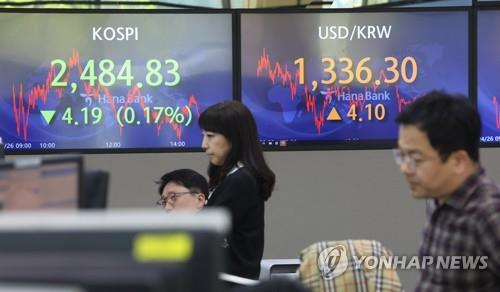- California Assembly OKs highest minimum wage in nation
- S. Korea unveils first graphic cigarette warnings
- US joins with South Korea, Japan in bid to deter North Korea
- LPGA golfer Chun In-gee finally back in action
- S. Korea won’t be top seed in final World Cup qualification round
- US men’s soccer misses 2nd straight Olympics
- US back on track in qualifying with 4-0 win over Guatemala
- High-intensity workout injuries spawn cottage industry
- CDC expands range of Zika mosquitoes into parts of Northeast
- Who knew? ‘The Walking Dead’ is helping families connect
Seoul shares down for 5th day despite big-cap tech rebound
South Korean stocks ended slightly lower Wednesday, as investors began assessing corporate quarterly earnings amid renewed concerns over the stability of the global banking system and the Sino-U.S. rivalry. The local currency fell to a yearly low against the U.S. dollar.
The benchmark Korea Composite Stock Price Index shed 4.19 points, or 0.17 percent, to close at 2,484.83, extending its losing streak to a fifth session.
Trading volume was heavy at 1.01 billion shares worth 12.24 trillion won (US$9.16 billion), with decliners outpacing gainers 548 to 318.
Foreigners and institutions sold a net 98.29 billion won and 147.82 billion won worth of shares, respectively, while individuals bought a net 220.94 billion won worth of shares.
The index opened slightly lower and had moved within a tight range through the session, as U.S. shares sank on Tuesday after the First Republic Bank reported a drop in deposits in the first quarter, which stoked fears of the global banking system instability.
“The index remained range-bound as investors digest first-quarter earnings reports amid concerns of an economic slowdown and various uncertainties. Volatility is expected to continue for the time being, though recent sharp falls have somewhat whetted investors’ appetite for risky assets to limit the decline,” Han Ji-young, an analyst at Kiwoom Securities, said.
Eyes are also on the summit between President Yoon Suk Yeol and U.S. President Joe Biden slated for Wednesday (Washington time), where the two sides will explore ways to deepen ties in semiconductors, batteries and other key areas, among other issues, amid the intensifying Sino-U.S. rivalry.
Earlier this week, the Financial Times reported that the U.S. asked South Korea to urge Samsung Electronics and SK hynix not to boost sales to China if Beijing bans Micron Technology from selling chips.
Large-cap shares gathered ground to limit the fall of the index.
Major chipmaker SK hynix surged 2.22 percent to 87,400 won as it expected market circumstances to improve in the second half of this year and vowed “a flexible and responsive approach” to its production operations, though it reported the worst quarterly result of 3.4 trillion won of losses in the first quarter.
Leading battery maker LG Energy Solution jumped 2.9 percent to 567,000 won after posting a 145 percent jump in its first-quarter profit.
Market bellwether Samsung Electronics grew 0.79 percent to 64,100 won.
But top chemical firm LG Chem sank 2.02 percent to 727,000 won. No. 1 steelmaker POSCO Holdings lost 2.11 percent to 371,500 won, and battery components maker POSCO Future M skidded 4.32 percent to 332,500 won.
Major carmakers ended mixed, with No. 1 automaker Hyundai Motor advancing 0.25 percent to 201,500 won and its affiliate Kia falling 1.04 percent to 85,700 won.
The local currency ended at 1,336.3 won against the U.S. dollar, up 4.1 won from the previous session’s close to hit the lowest figure for this year.
Bond prices, which move inversely to yields, closed higher. The yield on three-year Treasurys shed 0.6 basis point to 3.259 percent, and the return on the benchmark five-year government bond fell 1.4 basis points to 3.259 percent.












